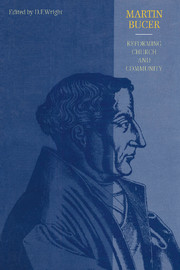Book contents
- Frontmatter
- Contents
- Notes on contributors
- List of abbreviations
- Introduction
- 1 Martin Bucer and the Old Church
- 2 The relation between church and civil community in Bucer's reforming work
- 3 Bucer's influence on Calvin: church and community
- 4 The church in Bucer's commentaries on the Epistle to the Ephesians
- 5 Church, communion and community in Bucer's commentary on the Gospel of John
- 6 Eucharistic communion: impulses and directions in Martin Bucer's thought
- 7 Martin Bucer and the ministry of the church
- 8 Infant baptism and the Christian community in Bucer
- 9 Bucer's ecclesiology in the colloquies with the Catholics, 1540–41
- 10 The Strasbourg Kirchenpfleger and parish discipline: theory and practice
- 11 Ecclesiological motifs behind the creation of the ‘Christlichen Gemeinschaften’
- 12 Martin Bucer in England
- 13 Martin Bucer and the Englishing of the Psalms: pseudonymity in the service of early English Protestant piety
- Bibliography
- Biblical index
- Index of Bucer's works
- Index of modern authors
- General index
11 - Ecclesiological motifs behind the creation of the ‘Christlichen Gemeinschaften’
Published online by Cambridge University Press: 22 September 2009
- Frontmatter
- Contents
- Notes on contributors
- List of abbreviations
- Introduction
- 1 Martin Bucer and the Old Church
- 2 The relation between church and civil community in Bucer's reforming work
- 3 Bucer's influence on Calvin: church and community
- 4 The church in Bucer's commentaries on the Epistle to the Ephesians
- 5 Church, communion and community in Bucer's commentary on the Gospel of John
- 6 Eucharistic communion: impulses and directions in Martin Bucer's thought
- 7 Martin Bucer and the ministry of the church
- 8 Infant baptism and the Christian community in Bucer
- 9 Bucer's ecclesiology in the colloquies with the Catholics, 1540–41
- 10 The Strasbourg Kirchenpfleger and parish discipline: theory and practice
- 11 Ecclesiological motifs behind the creation of the ‘Christlichen Gemeinschaften’
- 12 Martin Bucer in England
- 13 Martin Bucer and the Englishing of the Psalms: pseudonymity in the service of early English Protestant piety
- Bibliography
- Biblical index
- Index of Bucer's works
- Index of modern authors
- General index
Summary
The importance of the question
The creation of the ‘Christlichen Gemeinschaften’ – small communities of confessing Christians in the midst of the church of the majority at Strasbourg – during the years 1547–9 was certainly one of the most original elements of Bucer's activity. For proof one need cite only the objections they encountered and the unrelenting dispute they provoked in the ranks of the Strasbourg church. Yet these communities, surprising as much in their form as in their ecclesiological intention, have excited scarcely any interest from Bucer scholars. Is this because of the discredit to which they fell victim even during their author's lifetime – for they ceased to exist shortly after their creation while Bucer was still alive, exiled in England and incapable therefore of supervising their development? Or is it because this kind of ecclesiological venture undertaken by a Protestant Reformer has attracted little curiosity from Reformation historians?
It has been commonly held that the ecclesiological interest of Bucer's theology was adopted, clarified and made practicable by John Calvin at Geneva, and thus adopted by Calvinism. Perhaps we should seek the reasons for this lack of interest not only in the oblivion this community experiment was consigned to after Bucer's departure for exile (his successors at the head of the Strasbourg church always promoted a genuine Lutheranism), or in the fact that Bucer himself in his last work on the church, The Kingdom of Christ of 1550, no longer pursued the need for such small communities amidst the majority church, but also in the lack of interest aroused in Reformation research by ecclesiological issues in general.
- Type
- Chapter
- Information
- Martin BucerReforming Church and Community, pp. 129 - 143Publisher: Cambridge University PressPrint publication year: 1994
- 2
- Cited by



